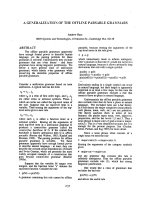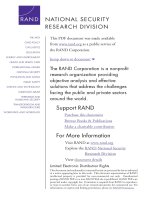Occupying Iraq- A History of the Coalition Provisional Authority doc
Bạn đang xem bản rút gọn của tài liệu. Xem và tải ngay bản đầy đủ của tài liệu tại đây (2.16 MB, 412 trang )
This document and trademark(s) contained herein are protected by law as indicated
in a notice appearing later in this work. This electronic representation of RAND
intellectual property is provided for non-commercial use only. Unauthorized
posting of RAND PDFs to a non-RAND Web site is prohibited. RAND PDFs are
protected under copyright law. Permission is required from RAND to reproduce,
or reuse in another form, any of our research documents for commercial use. For
information on reprint and linking permissions, please see RAND Permissions.
Limited Electronic Distribution Rights
Visit RAND at www.rand.org
Explore the RAND National Security
Research Division
View document details
For More Information
This PDF document was made available
from www.rand.org as a public service of
the RAND Corporation.
6
Jump down to document
THE ARTS
CHILD POLICY
CIVIL JUSTICE
EDUCATION
ENERGY AND ENVIRONMENT
HEALTH AND HEALTH CARE
INTERNATIONAL AFFAIRS
NATIONAL SECURITY
POPULATION AND AGING
PUBLIC SAFETY
SCIENCE AND TECHNOLOGY
SUBSTANCE ABUSE
TERRORISM AND
HOMELAND SECURITY
TRANSPORTATION AND
INFRASTRUCTURE
WORKFORCE AND WORKPLACE
The RAND Corporation is a nonprofit
research organization providing
objective analysis and effective
solutions that address the challenges
facing the public and private sectors
around the world.
Purchase this document
Browse Books & Publications
Make a charitable contribution
Support RAND
This product is part of the RAND Corporation monograph series.
RAND monographs present major research findings that address the
challenges facing the public and private sectors. All RAND mono-
graphs undergo rigorous peer review to ensure high standards for
research quality and objectivity.
NATIONAL SECURITY
RESEARCH DIVISION
Sponsored by the Carnegie Corporation of New York
Approved for public release; distribution unlimited
Oc c u p y i n g ir a q
a history of the coalition
provisional authority
Ja m e s Do b b i n s , se t h G. Jo n e s ,
be n J a m i n Ru n k l e , si D D h a R t h mo h a n D a s
The RAND Corporation is a nonprofit research organization providing
objective analysis and effective solutions that address the challenges facing
the public and private sectors around the world. RAND’s publications do
not necessarily reflect the opinions of its research clients and sponsors.
R
®
is a registered trademark.
© Copyright 2009 RAND Corporation
Permission is given to duplicate this document for personal use only, as long
as it is unaltered and complete. Copies may not be duplicated for commercial
purposes. Unauthorized posting of RAND documents to a non-RAND
Web site is prohibited. RAND documents are protected under copyright law.
For information on reprint and linking permissions, please visit the RAND
permissions page ( />Published 2009 by the RAND Corporation
1776 Main Street, P.O. Box 2138, Santa Monica, CA 90407-2138
1200 South Hayes Street, Arlington, VA 22202-5050
4570 Fifth Avenue, Suite 600, Pittsburgh, PA 15213-2665
RAND URL:
To order RAND documents or to obtain additional information, contact
Distribution Services: Telephone: (310) 451-7002;
Fax: (310) 451-6915; Email:
Library of Congress Cataloging-in-Publication Data
Occupying Iraq : a history of the Coalition Provisional Authority / James Dobbins
[et al.].
p. cm.
Includes bibliographical references.
ISBN 978-0-8330-4665-9 (pbk. : alk. paper)
1. Coalition Provisional Authority. 2. Postwar reconstruction—Iraq.
3. Bremer, L. Paul. 4. Iraq—Politics and government—2003– I. Dobbins, James.
II. Coalition Provisional Authority.
DS79.769.O33 2009
956.7044'31—dc22
2009007507
Cover design by Carol Earnest
The research described in this report was sponsored by the Carnegie
Corporation of New York and conducted within the International Security
and Defense Policy Center of the RAND National Security Research
Division (NSRD). NSRD conducts research and analysis for the Office
of the Secretary of Defense, the Joint Staff, the Unified Combatant
Commands, the defense agencies, the Department of the Navy, the Marine
Corps, the U.S. Coast Guard, the U.S. Intelligence Community, allied
foreign governments, and foundations.
Cover photo credits (clockwise from top left):
AP Photo/Jerome Delay; AP Photo/Dusan Vranic;
AP Photo/Khalid Mohammed; AP Photo/Hussein Malla
iii
Preface
e American engagement in Iraq has been looked at from many per-
spectives, including the flawed intelligence that provided the war’s
rationale, the failed effort to secure an international mandate, the rapid
success of the invasion, and the long ensuing counterinsurgency cam-
paign. is book focuses on the activities of the Coalition Provisional
Authority (CPA) and its administrator, L. Paul Bremer, who governed
Iraq from his arrival on May 12, 2003, to his departure on June 28
of the following year. It is an account of that occupation, seen largely
from American eyes—mostly from Americans working in Baghdad
for the CPA. It is based on interviews with many of those in Baghdad
and Washington responsible for setting and implementing occupation
policy, on the memoirs of American and Iraqi officials who have since
left office, on journalists’ accounts of the period, and on nearly 100,000
internal CPA documents to which the authors were allowed access.
is book recounts and evaluates the efforts of the United States
and its coalition partners to restore public services; reform the judi-
cial and penal systems; fight corruption; reduce inflation; expand the
economy; and create the basis for a democratic constitution, free elec-
tions, and representative government. It also addresses the occupation’s
most striking failure: the inability of the United States and its coalition
partners to protect the Iraqi people from the criminals and extremists
in their midst.
is account is based largely on primary sources that include, in
particular, the unclassified archives of the CPA. Because the CPA was a
hastily improvised multinational organization, an unusually high por-
iv Occupying Iraq: A History of the Coalition Provisional Authority
tion of its work was, in fact, done on an unclassified basis. Nevertheless,
a fuller history of the period will have to await the future release not
just of classified CPA documents, but of the much more voluminous
material held in Washington and by the U.S. military. A comparable
history of Combined Joint Task Force-7 (CJTF-7), the CPA’s military
counterpart, would shed further valuable light on this critical period.
Perhaps even more important to a fully rounded account of the period
will be the development and exploration of Iraqi sources.
In its occupation of Iraq, the United States fell far short of the
ambitious objectives set out by the Bush administration. is book
illustrates how and why. It seeks to evaluate the CPA’s performance
not just against the benchmarks set in administration rhetoric but also
against the record of numerous other, more or less contemporaneous,
efforts at postwar reconstruction and reform. Iraq was, after all, not the
first, but the seventh society that the United States had helped liberate
and then tried to rebuild in little more than a decade, the others being
Kuwait, Somalia, Haiti, Bosnia, Kosovo, and Afghanistan. e United
Nations conducted an even larger number of nation-building missions
over this same period. Iraq was among the largest and most challeng-
ing of these efforts, but it was not the first such attempt and will not
be the last. It is useful, therefore, to judge how American efforts in
Iraq stack up against other attempts to reform and reconstruct societies
emerging from conflict.
e authors would like to thank all those who participated in
interviews, reviewed early drafts of this work, and, in many cases,
did both. ese include Robert Blackwill, Lakhdar Brahimi, Doug-
las Brand, David Brannan, L. Paul Bremer, Andrew Card, Scott Car-
penter, Keith Crane, Catherine Dale, Douglas Feith, David Gompert,
Jeremy Greenstock, Terry Kelly, Patrick Kennedy, Roman Martinez,
Clayton McManaway, Frank Miller, Meghan O’Sullivan, Joshua Paul,
Andrew Rathmell, Charles Reis, Ricardo Sanchez, Omar al-Shahery,
Dan Senor, Matt Sherman, and Olin Wethington. e authors would
also like to thank Nora Bensahel, Steve Simon, and Dov Zakheim for
their careful and thoughtful reviews.
is research was sponsored by the Carnegie Corporation of New
York and conducted within the International Security and Defense
Preface v
Policy Center (ISDP) of the RAND National Security Research Divi-
sion (NSRD). NSRD conducts research and analysis for the Office of
the Secretary of Defense, the Joint Staff, the Unified Combatant Com-
mands, the defense agencies, the Department of the Navy, the Marine
Corps, the U.S. Coast Guard, the U.S. Intelligence Community, allied
foreign governments, and foundations.
For more information on RAND’s International Security and
Defense Policy Center, contact the Director, James Dobbins. He can be
reached by email at ; by phone at 703-413-
1100, extension 5134; or by mail at the RAND Corporation, 1200 S.
Hayes Street, Arlington, VA 22202. More information about RAND
is available at www.rand.org.
vii
Contents
Preface iii
Figures
xi
Summary
xiii
Abbreviations
xlv
CHAPTER ONE
e Origin of the CPA 1
CHAPTER TWO
Building the CPA 11
Legal Basis
12
e Chain of Command
14
Staffing and Organization
20
Early Decisions
28
Conclusion
28
CHAPTER THREE
Creating the Governing Council 31
Forming the Governance Team
32
Planning for an Iraqi Interim Authority
34
From Interim Authority to Governing Council
39
Conclusion
47
CHAPTER FOUR
Establishing Security 51
Disbanding the Army
52
viii Occupying Iraq: A History of the Coalition Provisional Authority
Building the New Army 61
Reforming the Police
71
Dealing with Neighbors: Iran, Syria, and Turkey
81
Iran
82
Syria
87
Turkey
89
Countering the Insurgency
92
Conclusion
102
CHAPTER FIVE
Governing Iraq 107
De-Ba’athification
112
Electricity
119
Health Care
126
Education
130
Local Government
137
Conclusion
145
CHAPTER SIX
Promoting the Rule of Law 149
Establishing the Judiciary
153
War Crimes and Crimes Against Humanity
158
Capturing Saddam
161
Handling Detainees
164
Abu Ghraib
167
Fighting Corruption
173
Charges of CPA Financial Mismanagement
177
Oil for Food
182
Freedom of the Press
186
Conclusion
195
CHAPTER SEVEN
Growing the Economy 197
Macroeconomic Stabilization
198
Issuing New Currency
203
Reforming the Banks
205
Contents ix
Debt Relief 211
Promoting Foreign Investment
212
Reducing Subsidies
217
Energy
217
Food
220
State-Owned Enterprises
223
Expanding Employment
227
Promoting Long-Term Development
233
Conclusion
238
CHAPTER EIGHT
Running the CPA 243
Staffing Shortages
244
Difficulties in Coordination
253
Funding Constraints
254
Inadequate Outreach
257
Reorganizing the CPA
260
Conclusion
263
CHAPTER NINE
Promoting Democracy 265
Seven Steps to Sovereignty
266
Stepping on the Gas
271
Building Iraqi Capacity
275
Working at the Grassroots
282
e Return of the United Nations
286
Drafting an Interim Constitution
289
Conclusion
294
CHAPTER TEN
Disarming Militias and Countering Insurgents 297
Muqtada al-Sadr
297
Fallujah
307
Disarming Militias
315
Conclusion
320
x Occupying Iraq: A History of the Coalition Provisional Authority
CHAPTER ELEVEN
Exit and Appraisal 323
Mission Accomplished or Mission Impossible?
326
Bibliography
335
Index
341
xi
Figures
1.1. ORHA Organizational Chart, January 2003 6
2.1. CPA Organizational Chart, July 2003
21
4.1. Significant Attacks, June 2003 to June 2004
93
4.2. Attacks on Coalition Forces, June 2003 to June 2004
94
10.1. Mock-Up Fliers for Fallujah Campaign
309
xiii
Summary
L. Paul Bremer arrived in Baghdad on May 12, 2003, with a broad
mandate and plenary powers. As administrator of the Coalition Provi-
sional Authority, he was charged with governing Iraq and promoting
the development of a functioning democracy that, it was hoped, would
serve as a model for the entire Middle East. Bremer could dispose of
all Iraqi state assets and direct all Iraqi government officials. He pos-
sessed full executive, legislative, and judicial authority. His instructions
from Washington were quite general, and for the most part oral. Over
the next several months he received plentiful advice but little further
direction.
As a practical matter, Bremer’s powers were much more limited
than they appeared. He had no direct authority over 98 percent of
official American personnel in Iraq. ey were under military com-
mand. Most Iraqi officials had abandoned their offices, which had in
turn been ransacked in rampant looting that had stripped most public
facilities throughout the country to the bare walls, and beyond. e
Iraqi army had deserted en masse, as had much of the police force.
Several billion dollars in Iraqi funds were immediately available, but
beyond this ready cash, the state was basically broke and producing
no further revenue. Washington was still under the impression that
the occupation would largely pay for itself and had made provision for
only limited financial support to reconstruction. As a result, the CPA
relied, throughout its lifespan, principally on Iraqi money to fund both
reconstruction and Iraqi government operations.
Neither could Bremer count on much help from the rest of the
world. e invasion had been launched against the advice of several
xiv Occupying Iraq: A History of the Coalition Provisional Authority
of America’s most important allies. Many of Iraq’s neighbors, includ-
ing Iran and Syria, were hostile to U.S. efforts and suspicious that
the United States might eventually want to overthrow their regimes
as well. e decision to treat Iraq, for legal purposes, as a conquered
nation further increased the controversy associated with the enterprise.
e occupations with which most Iraqis were familiar were the Brit-
ish control of their country after World War I and Israel’s occupation
of the West Bank and Gaza, then in its fourth decade. ese were not
reassuring precedents. An alternative to formal occupation would have
been a UN-authorized “peace enforcement operation,” as in Bosnia
or Kosovo. at sort of arrangement might have attenuated, but not
eliminated, Iraqi and regional resistance to the American presence.
e price for such an international endorsement would have been some
level of international oversight. In the bitter aftermath of the failed
attempt to gain United Nations Security Council approval of the inva-
sion, neither the United States nor the UN was interested in having the
latter assume such a role in Iraq’s governance.
On May 22, 2003, the UN Security Council formally recognized
but did not endorse the United States and the United Kingdom as
occupying powers. Attempts were made to enlist as many coalition
countries as possible, but with limited success. e United Kingdom
had contributed a large contingent of troops for the invasion but soon
scaled back its contribution to the occupation to less than 10 percent of
the total. Other allied contingents were even smaller and generally less
capable. Unlike the Balkans, where America’s allies had contributed
75–80 percent of the soldiers and money, the United States was going
to have to man and pay for this operation largely on its own.
Arrival and Early Decisions
Bremer inherited the Office of Reconstruction and Humanitarian
Assistance (ORHA), which had been structured in the belief that the
Iraqi administration would remain in place, any American occupation
would be short-lived, and the main challenge would be dealing with
the consequences of the use of weapons of mass destruction and other
Summary xv
war-related damage. e transition from ORHA, headed by Army
Lieutenant General Jay Garner (Ret.), to the CPA did not go smoothly.
Secretary of Defense Donald Rumsfeld informed Garner about the
impending change in leadership only one day after Garner’s arrival in
Baghdad; Garner had expected to be superseded, but not so quickly.
Rumsfeld encouraged Garner to stay on under Bremer, but Garner
declined, as he did again a couple of weeks later when Bremer made
the same request.
Almost immediately on his arrival in Baghdad, Bremer announced
two major steps that would prove to be the most controversial of his
tenure. e first was to purge some 30,000 senior Ba’ath party mem-
bers from public employment, and the second was to disband the Iraqi
army. Both decisions, the details of which are considered further below,
had been briefed to the President and his principal cabinet advisors and
approved by Secretary Rumsfeld. Garner had not been consulted, how-
ever, and he advised Bremer against both steps on learning of them, as
did other members of the ORHA team. Bremer declined to reconsider
either measure.
No one in Washington had kept Garner apprised of the major
changes in approach to the occupation being considered there, in part
because no one in Washington short of Secretary Rumsfeld had been
charged with keeping Garner so informed. Garner was supposed to be
operating under the direction of General Tommy Franks, commander
of U.S. Central Command, but Franks was soon to retire and also
somewhat divorced from the policy discussions then under way in the
Pentagon. Bremer might have been wise to have informed and con-
sulted Garner on these issues before his arrival in Baghdad, but Bremer
was not yet in charge, had never met Garner, and was fully occupied
with preparing for his assignment. e result was to leave a residue of
bitterness and recrimination from the very start of Bremer’s tenure.
Building the CPA
Bremer personally recruited a number of experienced and accomplished
people to serve as his senior staff, although some of them showed up late
xvi Occupying Iraq: A History of the Coalition Provisional Authority
and few stayed for the duration. eir successors were generally also of
good, sometimes superior, quality, but rapid and frequent staff turn-
over had a decidedly negative effect on continuity. Even more debili-
tating was Washington’s persistent inability to fill more than half the
mid-level and junior positions in the CPA and these seldom for more
than three to six months at a time. As a result, while intended to be a
dominantly civilian organization, the CPA remained heavily military.
Many personnel were reserve officers, although a number of them pos-
sessed relevant civilian experience. Many younger staff were recruited
through the administration’s political patronage machinery. ere was
a chronic shortage of experienced middle-level managers. In particu-
lar, there was a shortage of Arabic-speaking regional experts and offi-
cials who had worked in previous postconflict stabilization efforts. e
result was an organization made up largely of senior supervisors and
junior subordinates.
Bremer rapidly established the skeleton of an organization
intended to serve as a “government within a government.” Half a dozen
offices supervised a larger number of Iraqi ministries. Alongside these
line units was a staff that included a general council, a financial man-
agement office, a policy planning unit, and an executive secretariat.
Bremer did not, at first, formally appoint a principal deputy, although
Clayton McManaway, a former ambassador with extensive service in
wartime Vietnam, served as his closest advisor and assumed charge
when Bremer was out of the country. Neither Bremer nor his chief
lieutenants ever had any precise idea how many people were working
for them on any given day. e Green Zone mess halls were feeding up
to 7,000 people, but most of them were either under the military com-
mand or contractors working for the military. At its peak, the CPA’s
notional staff was around 2,000, of whom perhaps half were in the
country at any one time. ose who were present routinely worked
80-hour weeks. A significant minority of positions within the CPA
were filled by non-American officials from allied countries.
Bremer’s management style was very hands-on. He exhibited great
energy and a quick grasp of complex issues. He was willing to take
responsibility and make difficult decisions. He was able, through his
own example, to secure the respect, loyalty, and affection of his numer-
Summary xvii
ous staff. Despite these strengths, the CPA structure was overly central-
ized, and Bremer was excessively burdened by the number of subordi-
nates reporting directly to him and the variety of issues requiring his
attention. e lack of any agreed-on plan, the improvised nature of the
organization, and the rapidity of staff turnover made a greater degree
of delegation difficult and, in the early days, possibly dangerous; but
Bremer would have been better served by formally empowering one or
two deputies, as he eventually did six months later.
e CPA was built from scratch, and every bureaucratic relation-
ship had to be crafted from whole cloth. is went from determining
who paid for use of the motor pool or mess hall to Bremer’s relation-
ship with his military partner and Washington superiors. American
and coalition military forces came under Lieutenant General Ricardo
Sanchez, the commander of CJTF-7. Bremer and Sanchez, by their
own accounts, maintained cordial relations. Sanchez was under formal
orders from Secretary Rumsfeld to support Bremer, which he and his
command did quite extensively. is injunction, in Sanchez’s view, did
not accord Bremer oversight of, or even necessarily visibility into, mili-
tary operations at the tactical level. e two men differed on occasion
and their staffs did so more often, but they also collaborated closely.
e extensive overall level of CJTF-7 support for the CPA is notewor-
thy given that Sanchez’s staff resources, although more numerous than
Bremer’s, were almost as undermanned as were those of the CPA.
e CPA’s relationship with Washington was also improvised
and unclear, as was Bremer’s with his bosses. e CPA was, at one
and the same time, an element of the Defense Department, a multi-
national organization, and a foreign government. In their capacity as
the government of Iraq, CPA managers rejected efforts by Washing-
ton agencies, most notably the White House Office of Management
and Budget, to impose strictures on how the CPA spent Iraqi funds.
Bremer was subordinate to Secretary Rumsfeld but also a presidential
envoy. He communicated directly with the President and the White
House staff. is eventually led Rumsfeld to complain to both Bremer
and Condoleezza Rice, the President’s ’national security advisor. ese
complaints were unavailing, and from the fall of 2003, Bremer effec-
tively worked under guidance from the White House. Rumsfeld seems
xviii Occupying Iraq: A History of the Coalition Provisional Authority
to have felt that Bremer was trying to circumvent him, but the main
problem was that Rumsfeld had never established within the Defense
Department an adequate mechanism to monitor, support, and guide
the CPA’s activities and to keep the White House and other relevant
agencies informed on what was going on in Baghdad.
Putting both Bremer and Sanchez under the Secretary of Defense
was intended to reduce tension between the civil and military com-
ponents of the U.S. effort, but it probably had the opposite effect.
Rumsfeld’s management style was to nag his subordinates, peppering
them with frequent suggestions but seldom issuing firm instructions or
taking clear responsibility. As a result, disagreements between Bremer
and Sanchez were rarely adjudicated in a timely fashion. Additionally,
the sheer novelty of the arrangement made for difficulties. Friction
between American ambassadors and local American military com-
manders is not infrequent, nor is it unheard of for American diplomats
to deal directly with the White House. Such relationships are gov-
erned, however, by law, regulation, presidential directive, and decades
of customary practice. As a consequence, it is well understood how all
the players should behave, even if they do not always do so. With the
CPA, a unique political experiment under Defense Department aus-
pices in what became an active war zone, all such relationships had to
be worked out anew.
Bremer and his staff were fond of complaining about Washing-
ton’s “thousand-mile screw driver,” and they were indeed the recipients
of copious advice and a good deal of micromanagement on the use of
U.S. funds. During the CPA’s early months, however, Bremer was the
victim not of too much policy oversight but of too little. Rumsfeld
seems to have refused to allow non–Defense Department personnel in
the CPA to communicate directly and formally with their own agen-
cies. In addition, for the first few months the Defense Department
failed to repeat Bremer’s reports to the State Department, the White
House, or the CIA, and was sometimes slow to do so thereafter. e
White House, for its part, had decided to delegate responsibility for
interagency coordination about Iraq to Bremer, a manifestly impos-
sible task, given his limited staff, manifold other responsibilities, and
the fact that non–Defense Department personnel in Baghdad had only
Summary xix
limited capacity to communicate with their home agencies, particu-
larly in the early months. In consequence, other agency personnel in
Baghdad were not in a position to fully tap the expertise of their home
offices or fully represent their agency’s views, although a great deal of
coordination was achieved through informal phone calls and unclas-
sified, unofficial email. Eventually, Rice was reduced to sending her
staffers on forays into the Pentagon to find out what was going on. As
a result of these communication blockages, which persisted through-
out the CPA’s lifespan to some degree but were particularly acute in
the spring and summer of 2003, senior Washington officials were less
informed and more surprised by events and decisions emanating from
Baghdad than they should have been.
Creating the Governing Council
Prior to Bremer’s appointment, American planning for post-Saddam
Iraq had proceeded along two ill-defined but divergent tracks, one
moving toward the extended occupation, as finally eventuated, the
other toward a swift handoff to a nonelected Iraqi successor regime,
as had occurred in Afghanistan 15 months earlier. In Washington, the
issue had been papered over in an interagency agreement to form an
interim Iraqi administration. What was left undefined was whether
this administration would have independent authority or would simply
provide a vehicle through which the United States would govern Iraq—
much as the Japanese government, which remained in existence after
its 1945 surrender, was the medium through which General Douglas
MacArthur had ruled Japan.
General Garner, the head of ORHA, and Zalmay Khalilzad, a
National Security Council (NSC) staffer and presidential envoy to the
Iraqi opposition, seemed to be proceeding on the assumption that the
occupation would be short-lived. is is certainly the impression they
conveyed to Iraqi leaders with whom they were consulting in an appar-
ent effort to form an Iraqi government.
Before leaving for Baghdad, Bremer secured President Bush’s
agreement that there would be only one American envoy in Iraq. On
xx Occupying Iraq: A History of the Coalition Provisional Authority
his arrival, he began consultations leading to the formation of the Gov-
erning Council, a body of Iraqi émigré and internal leaders chosen by
Bremer with the help of the UN and a team of American and Brit-
ish regional experts. is body was to be largely advisory, although its
influence and prerogatives would grow over the succeeding months.
Bremer observed, in defense of his decision not to accord this group
executive or legislative power, that a body that could not agree on its
own chairman (the Governing Council chose to rotate that position
on a monthly basis) could hardly be ready to rule. Others have specu-
lated that if given real authority, the council might have behaved more
responsibly. As with any counterfactual, it is impossible to prove or dis-
prove this hypothesis, but the behavior of these same politicians when
they were accorded real power a year later does not suggest that their
reformation would have been rapid.
Bremer regarded the decision to mount an extended occupation
rather than immediately turn power over to an Iraqi interim govern-
ment as having been made, in principle, prior to his appointment and
embodied in the general guidance he received from the President and
Rumsfeld. e record on this point is unclear. e continuing debate
over when and by whom a decision was taken to mount an extended
occupation reflects the general lack of clarity characteristic of the
administration’s planning for and early management of its intervention
in Iraq. Given that neither the President nor any of his principal advi-
sors had so much as met Bremer prior to his selection, something more
than simple confidence in his judgment seems to have been in play in
the leeway he was given. It seems likely, therefore, that the decision to
supersede Garner almost immediately on his arrival in Baghdad was
occasioned by the mounting chaos there and was accompanied by an
inclination to assert a firmer American grip, one result of which was
the selection and dispatch of Bremer.
What is certain is that this shift in policy left the Iraqi leaders
feeling deceived, military commanders uninformed, and senior levels
of the administration unconsulted. It was not inappropriate for the
administration to have retained two options for governing Iraq, given
uncertainties about what they would encounter once Saddam fell. In
the event, finding Iraq descending into chaos and the Iraqi elites badly
Summary xxi
divided, it was not unreasonable to decide in favor of a more extended
occupation. What was censurable was to have failed to distinguish
between the two approaches, engage all the President’s principal advi-
sors on the decision, make a clear-cut choice in the end, arm Bremer
and Sanchez with more than general and largely oral instructions,
resource the operation commensurate with the expanded mission, and
take a consistent line with the Iraqi political leadership.
For several months the Iraqi ministries were run, to the extent
they functioned at all, by CPA senior advisors who directed the activ-
ity of their principal Iraqi subordinates. In August, Bremer allowed
the Governing Council to appoint Iraqi ministers to head each agency.
ereafter, CPA advisors played a slightly less prominent role, although
they retained veto authority over major decisions and controlled many
of the purse strings.
Establishing Security
Bremer understood the preeminent importance of establishing security
as the first task of any occupying force. While still in Washington,
he was told that most American troops were to be withdrawn from
Iraq within the next few months, leaving as few as 30,000 by the fall
of 2003. He immediately raised the issue of troop levels with Rums-
feld and President Bush before leaving for Baghdad. On the day of his
arrival, he told his senior staff that law and order would be their first
priority. He repeated this in a message to the President ten days later.
Bremer made an early decision to retain the Iraqi police but to
build an entirely new army from scratch. Neither approach produced
positive results. e new Iraqi army eventually became a relatively
competent and reliable force, but it took several years. e police force,
which had not been disbanded, was even slower to develop; it became,
indeed, a serious source of insecurity for the next several years. is
experience indicates that the CPA’s critical failure lay not so much in
retaining police or in disbanding the army, as some have charged, but
rather in failing to reform and rebuild either of these forces in a timely
fashion. Yet it is not clear whether the capacity to raise and train for-
xxii Occupying Iraq: A History of the Coalition Provisional Authority
eign security forces on the scale needed then existed anywhere in the
U.S. government. In early 2004, the U.S. military assumed respon-
sibility for rebuilding both the army and police but initially did only
marginally better. Numbers increased but quality was much slower to
follow.
e decision to disband the army has become the single most-
cited criticism of the CPA’s 14-month reign. is step was not taken
without considerable forethought. Walter Slocombe, who had served as
Under Secretary of Defense for Policy throughout much of the Clinton
administration, had been chosen to head the security-related compo-
nents of the CPA well before Bremer’s appointment. He had been con-
sulting with various DoD officials in preparation for that task when
Bremer was named. By then it had become clear that the Iraqi army
had disintegrated under U.S. military pressure and that most of its
facilities had subsequently been destroyed in the looting. Slocombe and
other senior DoD officials decided that it would be better to disband
the existing Iraqi army and raise a new one, employing many current
army officers in the process but not building on the old foundation.
is step would obviate the need to employ a bloated and politicized
officer corps or to force the return of reluctant and ill-paid conscripts.
It would also, in Bremer’s view, help persuade the Iraqi population that
the break with the former regime was final and irreversible.
An order to that event was drafted and cleared throughout the
Pentagon shortly before Bremer’s departure for Baghdad. It also seems
to have been cleared with Central Command and the staff of the senior
American military commander in the field, although Lieutenant Gen-
eral David McKiernan, Sanchez’s predecessor, has since denied approv-
ing or even knowing of the decision in advance. Slocombe discussed
the proposal with British officials in London on his way to Baghdad.
ey raised no objection. On May 15, Garner tried, unsuccessfully,
to persuade Bremer to reconsider the measure. On May 19, Rumsfeld
approved the order. On May 22, the President and the other members
of the National Security Council were briefed. Again, no one raised
any objection. e next day Bremer issued the order.
is decision process, while more orderly, inclusive, and clear-cut
than some administration actions of the period, was far from perfect.
Summary xxiii
e order had not been discussed on an interagency basis until the
President and his chief advisors were informed on the day before its
announcement. Stephen Hadley, Rice’s deputy on the NSC staff, and
Air Force General Richard Meyers, Chairman of the Joint Chiefs of
Staff, both complained later that they had not been consulted, although
the draft order had been shown to more junior NSC and military offi-
cials. At least some of the military officers who acquiesced in this deci-
sion did so in the misapprehension that large elements of the army
would quickly be recalled to form the basis for a new force, which was
not what Bremer and Slocombe intended. eir failure to clarify their
intention in this regard from the beginning led to considerable subse-
quent resentment and recrimination. Given that the Iraqi army had
already dissolved, there was no immediate necessity to issue such an
order, other than the desire to demonstrate to the Iraqi population that
there would be no return of a Saddamist-style government.
e order was certainly remiss in one respect: It made no provi-
sion for payments to the separated soldiers or for their reintegration
into civilian society. A month later, provision was made for stipends to
be paid to former career personnel; a month later still, such payments
actually began.
A fully thought-through program for disarming, demobilizing,
and reintegrating the old army would undoubtedly have expedited the
selective recall of individuals and perhaps elements into the new army.
It might also have recovered at least some of the weapons the dispers-
ing soldiers had taken with them. Given that disarmament, demobi-
lization, and reintegration schemes had by 2003 become a standard
part of postconflict reconstruction missions, there was no good reason
not to have incorporated all aspects of such a program in the original
order, even if it had been necessary to delay its promulgation to do so.
Approaching the issue in this more comprehensive fashion could have
attenuated the negative reaction among former soldiers and their fami-
lies, recouped some of the weapons former soldiers had take taken with
them, provided those separated from the service a constructive outlet
for their continued activity, and facilitated recruiting some of them
back into the new army in due course. ORHA’s plans had called for
such a program, but it assumed the army would be present for duty.









